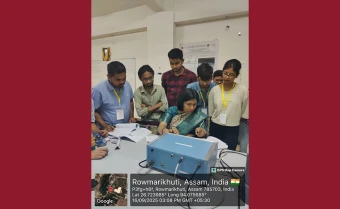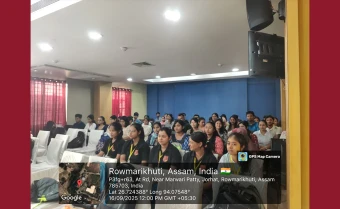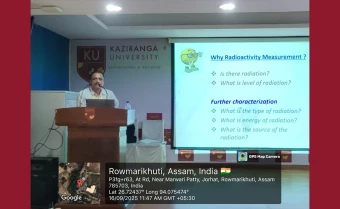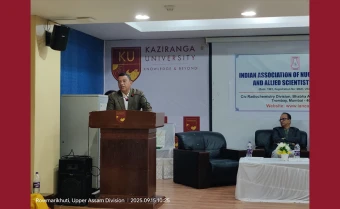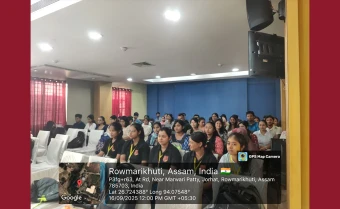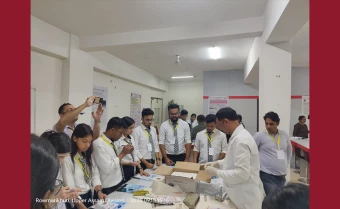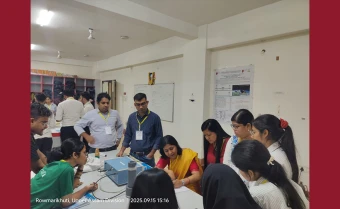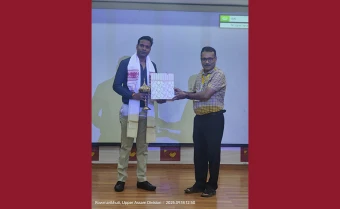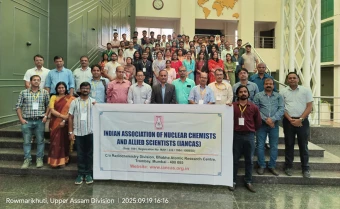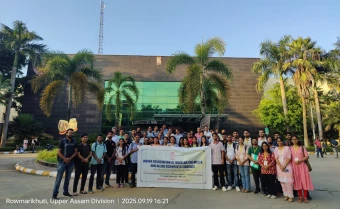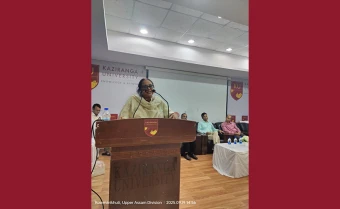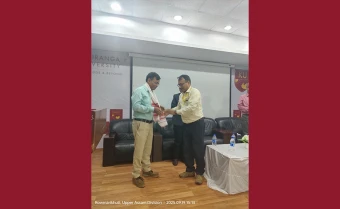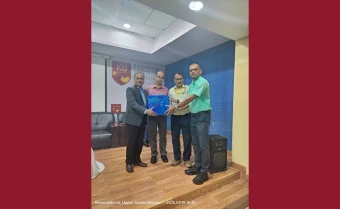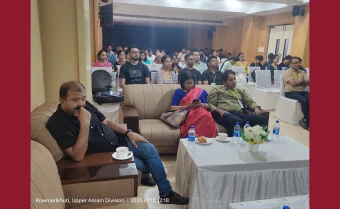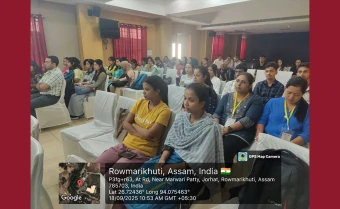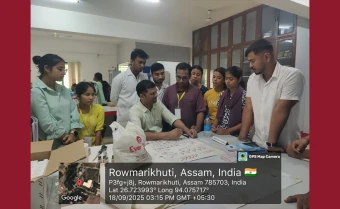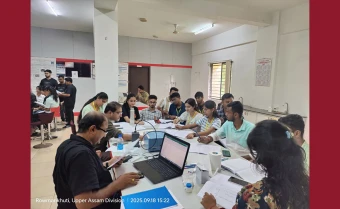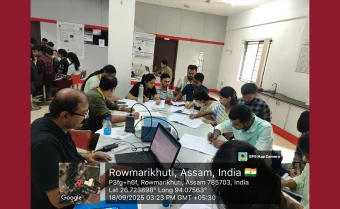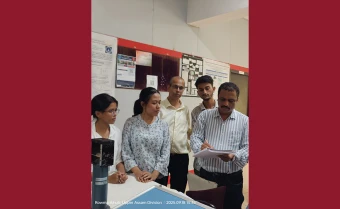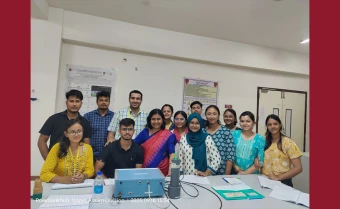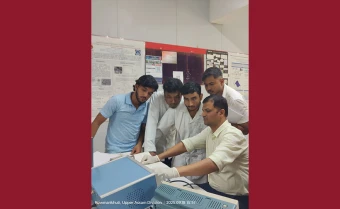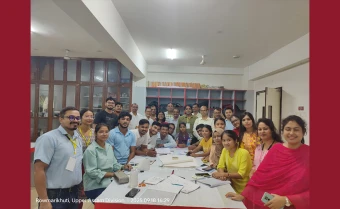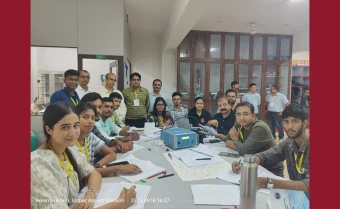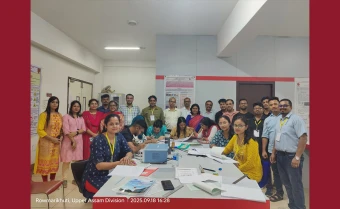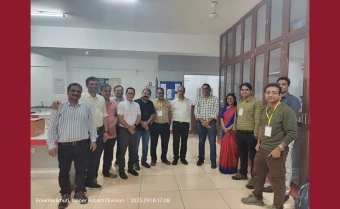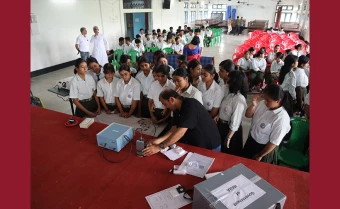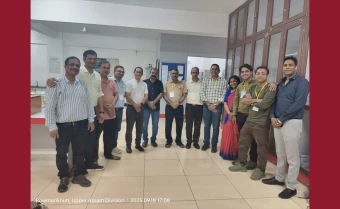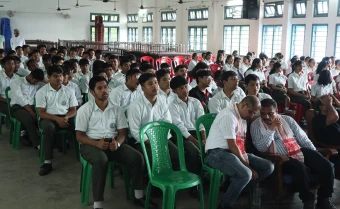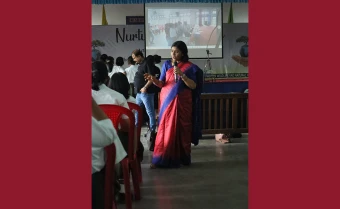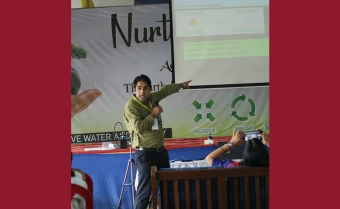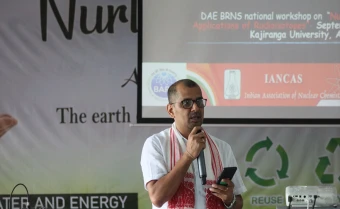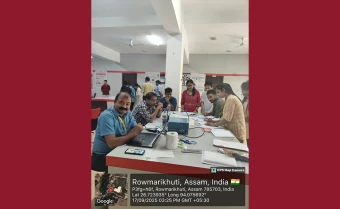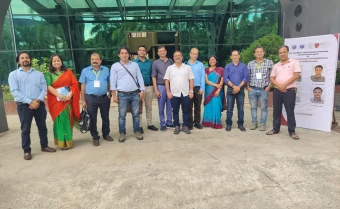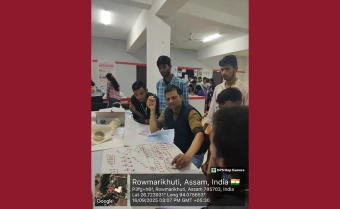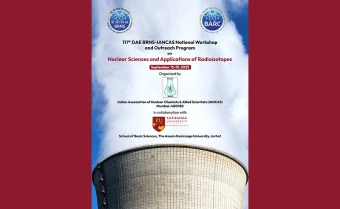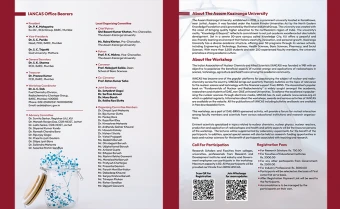111th DAE BRNS-IANCAS National Workshop on Radiochemistry and Application of Radioisotopes
Academic Year: 2025-26
Date: September 15th – 19th September 2025
Venue: Seminar Hall 1 (Ground Floor), The Assam Kaziranga University, Jorhat, Assam
Mode of the Event: Offline
Total number of participants: Eighty (80)
About the Workshop
The Indian Association of Nuclear Chemists and Allied Scientists (IANCAS) was founded in 1981 with an objective to popularize the beneficial aspects of nuclear energy and applications of radioisotopes in science, technology, agriculture and health care among the academic community.
IANCAS has become one of the popular platforms for popularizing the subject of nuclear and radio-chemistry across the country. IANCAS brings out quarterly thematic bulletins on the topic of relevance to the nuclear science and technology with the financial support from BRNS. The Association’s popular book on “Fundamentals of Nuclear and Radiochemistry” is widely sought amongst the academia, researchers and students of DAE, non-DAE units and Universities. To achieve the excellence in popularizing the nuclear sciences through electronic media, IANCAS has its own website (www.iancas.org.in) which is updated regularly. Information about the workshops, awards and various activities of IANCAS are available on the website. All the publications of IANCAS including bulletins and books are available in free downloadable form.
This workshop, as a part of DAE-BRNS sponsored activity, will provide a forum for mutual interaction among faculty members and scientists from various educational institutions and research organizations.
Eminent scientists specialized in topics related to nuclear chemistry, nuclear physics, nuclear reactors, production and application of radioisotopes and health and safety aspects will be the resource persons of the workshop. The lectures will be supplemented by Laboratory experiments for the benefit of the participants. In addition, special session will also be held on research funding opportunities in basic and nuclear sciences for the benefit of participants associated with teaching and research.
The 111th DAE BRNS-IANCAS National Workshop on Radiochemistry and Application of Radioisotopes was held at The Assam Kaziranga University, Jorhat, Assam, from September 15 to 19, 2025. The event brought together distinguished scientists, academicians, and students to explore the wide-ranging applications of radiochemistry and nuclear science for societal benefit.
The five-day programme aimed to popularize nuclear sciences and enhance awareness about the applications of radioisotopes in diverse fields including medicine, agriculture, food, and industry. It also highlighted their potential role as sustainable alternatives to fossil fuels. Coordinated by Dr. Ashoke Chandra Deb, Senior Scientist, BARC, the workshop featured lectures from six eminent scientists, including Dr. Y. K. Bhardwaj, Associate Director, BARC. In addition to lectures, participants received hands-on experimental training on the applications of radioisotopes in various domains.
Day One was graced by eminent scientists from BARC, the Hon’ble Vice Chancellor and Registrar of the University, along with all Deans of The Assam Kaziranga University. Faculty members of the School of Basic Sciences, students, and participants from various institutes also attended the inaugural programme, marking the beginning of a significant academic and research-oriented event.
The technical session of Day 1(one) began with a keynote address by Dr. Y. K. Bhardwaj on “Nuclear Technology for Social Prosperity.” He highlighted the role of nuclear science beyond power generation, emphasizing its contributions to healthcare, agriculture, and environmental sustainability. This was followed by Dr. (Smt.) Aishwarya S. Kar’s lecture on radioactivity and nuclear decay, providing participants with a strong theoretical foundation. The day concluded with Dr. Nimai Pathak’s session introducing the practical component of the workshop.
Day 2 (two) featured technical lectures on the ‘Interaction of Radiation with Matter’ by Dr. Nimai Pathak, ‘Radiation Detection and Measurements’ by Dr. Nilesh S. Tawade, and ‘Chemistry of Actinides’ by Dr. (Smt.) Aishwarya S. Kar. The sessions emphasized radiation processes, detection technologies, and the role of actinides in nuclear fuel cycles. The afternoon was dedicated to hands-on experiments with nuclear detectors, conducted in collaboration with M.Sc. students of the School of Basic Sciences.
On Day 2 (two), a few members of the expert team visited CSIR-NEIST Kendriya Vidyalaya, where they conducted hands-on experiments and interacted with school students below Class-12. This outreach initiative aimed to spark curiosity about nuclear science and radiochemistry among young learners, offering them early exposure to scientific concepts through practical demonstrations and engaging discussions.
On Day 3 (three), coinciding with Vishwakarma Puja, the technical lectures were conducted in hybrid mode. Dr. Kaushik Sanyal spoke on ‘Nuclear Structure and Stability’, Dr. Chandan Kumar on ‘Radioisotopes in Research and Development’, and Shri Uday K. Thakur on ‘Radiation Safety and Radiological Laboratories’. Later, participants rejoined on campus for hands-on sessions using nuclear detectors.
Day 4 (four) featured three insightful lectures. Dr. A. C. Deb presented on ‘Nuclear Reactors’, emphasizing design, safety, and sustainability. Dr. Kaushik Sanyal discussed the ‘Application of Radioanalytical Techniques’, and Dr. Ravindra Bansal elaborated on ‘DAE Technologies for Societal Applications’. The afternoon continued with practical training using nuclear detectors.
Day 4 (four), a few members of the expert team also visited Don Bosco School, Bungshug, Jorhat, where they conducted hands-on experiments and interactive sessions with school students below Class-12. The initiative aimed to inspire curiosity about science and provide young learners with early exposure to the fundamentals of nuclear science and its applications.
Day 5 (Five) before lunch featured two insightful lectures — “Mandate of DAE and Career Opportunities” by Dr. S. Jeyakumar and “Radioisotopes in Healthcare and Industry” by Dr. Chandan Kumar — followed by a quiz competition conducted by Dr. Nimai Pathak and his team.
Day 5 (Five) after lunch, the 111th DAE BRNS–IANCAS National Workshop on Radiochemistry and the Application of Radioisotopes concluded on September 19, 2025, with a grand valedictory session held at The Assam Kaziranga University, Jorhat. The session was graced by the Registrar of Kaziranga University, the Deans of KU, the Director of CSIR-NEIST Dr. Binoy Saikia (CSIR-NEIST and Bhatnagar Awardee), Dr. Bidyut Sarmah of Assam Agricultural University, and distinguished scientists from BARC, alongside faculty members and participants.
During the ceremony, the Department of Atomic Energy (DAE) and BARC extended significant academic contributions under their outreach scheme. Books on radioactivity and nuclear physics were distributed to various institutes across the North-East and to Kaziranga University, benefitting institutions from which participants had registered for the workshop. This gesture aimed to strengthen academic resources in the region and to inspire further learning in nuclear sciences.
In addition, BARC handed over a Gamma Ray Spectrometer to The Assam Kaziranga University, marking a milestone in building research infrastructure. The instrument was formally transferred to the Department of Physics by the Dean of the School of Basic Sciences on September 26, 2025. This advanced facility is expected to greatly enhance academic teaching and research opportunities, enabling students and scholars to pursue experimental studies in nuclear and radiation physics.
The workshop witnessed an overwhelming response, with approximately 80 participants registering from across the region. The blend of technical lectures, hands-on training, and interactive sessions provided attendees with a comprehensive and enriching experience.
The valedictory session concluded with the distribution of participation certificates and expressions of appreciation to the organizers, speakers, and participants. The workshop successfully met its objectives of disseminating knowledge, fostering collaboration, and equipping participants with both theoretical insights and practical exposure in radiochemistry and its applications.
Dr. Ashoke Deb, the workshop coordinator, expressed his delight that the workshop was being held in North Eastern India after a long interval. A native of Shillong, Meghalaya, he completed his post-graduation at NEHU, Shillong, and earned his Ph.D. from IIT Bombay. He extended his heartfelt gratitude to the convener and local coordinator Dr. Nabajyoti Saikia, Dean of the School of Basic Sciences; co-coordinator Dr. Ratan Kumar Saha; and joint secretaries Dr. Satyabrat Gogoi, Dr. Sarfraz Ahmed, Dr. Munu Borah, and Dr. Rekha Rani Dutta for their dedicated efforts toward the noble cause of popularizing nuclear science and radioisotopes.
The five-day workshop successfully integrated theoretical insights, practical training, and interactive sessions, providing participants with a comprehensive understanding of nuclear science and radiochemistry while reinforcing their societal relevance. The program concluded with renewed enthusiasm for advancing research and applications in the nuclear domain.
Agenda for the Inaugural Session
